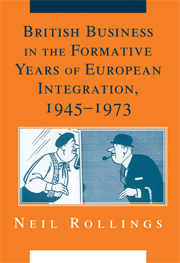Book contents
- Frontmatter
- Contents
- List of Tables and Figure
- Series Editors' Preface
- Acknowledgements
- Abbreviations
- 1 Introduction
- PART I ECONOMIC REALITIES
- PART II THE DEVELOPMENT OF PERCEPTIONS OF EUROPEAN INTEGRATION
- 4 From 1945 to June 1955: The Marshall Plan and the European Coal and Steel Community
- 5 The Establishment of the Common Market and the Free Trade Area Proposals, 1955–1958
- 6 Creating EFTA, Applying to the EC, and de Gaulle's Veto, 1958–1963
- 7 After de Gaulle's First Veto, the Second Application, and the Second Veto, 1963–1968
- 8 The End Game: From the Hague Summit to British Accession, 1969–1973
- PART III EUROPEAN INTEGRATION AS MORE THAN TARIFFS
- Conclusion
- Index
4 - From 1945 to June 1955: The Marshall Plan and the European Coal and Steel Community
from PART II - THE DEVELOPMENT OF PERCEPTIONS OF EUROPEAN INTEGRATION
Published online by Cambridge University Press: 02 December 2009
- Frontmatter
- Contents
- List of Tables and Figure
- Series Editors' Preface
- Acknowledgements
- Abbreviations
- 1 Introduction
- PART I ECONOMIC REALITIES
- PART II THE DEVELOPMENT OF PERCEPTIONS OF EUROPEAN INTEGRATION
- 4 From 1945 to June 1955: The Marshall Plan and the European Coal and Steel Community
- 5 The Establishment of the Common Market and the Free Trade Area Proposals, 1955–1958
- 6 Creating EFTA, Applying to the EC, and de Gaulle's Veto, 1958–1963
- 7 After de Gaulle's First Veto, the Second Application, and the Second Veto, 1963–1968
- 8 The End Game: From the Hague Summit to British Accession, 1969–1973
- PART III EUROPEAN INTEGRATION AS MORE THAN TARIFFS
- Conclusion
- Index
Summary
In 1995, Clemens Wurm noted that the role of industrial and economic interest groups in the early years of European integration had been little researched. Further, he believed, “The predominant academic view is that the attitude of European industry was in general one of scepticism or outright rejection.” Since then a number of studies have qualified this picture. The conventional image of British industry at this time has been one of disinterest in European integration until at least the mid-1950s. Robert Lieber's key study of the role of the FBI, the Trade Unions Congress (TUC) and the National Farmers' Union (NFU) in the development of British policy on European integration starts in 1956. Most other works take their lead from this. Indeed, prominent representatives of British industry themselves confirmed this position when looking back at the subject. Sir Norman Kipping's memoirs only add further confirmation:
We thought of Europe as thickly populated with do-gooders putting forward idealistic plans for this, that and the other that had very little to do with us. … So with our continuing preoccupation with Commonwealth trade and the GATT [General Agreement on Trade and Tariffs] we light-heartedly christened this new European manifestation as “Schumania.”
Nevertheless, the period from the end of the war in 1945 to the opening of the talks in June 1955 at Messina in Sicily, which were to presage the next stage of European integration, has been seen as a coherent and crucial stage in the development of Britain's attitude to European integration, first in relation to the Marshall Plan and then with regard to the European Coal and Steel Community (ECSC).
- Type
- Chapter
- Information
- Publisher: Cambridge University PressPrint publication year: 2007



